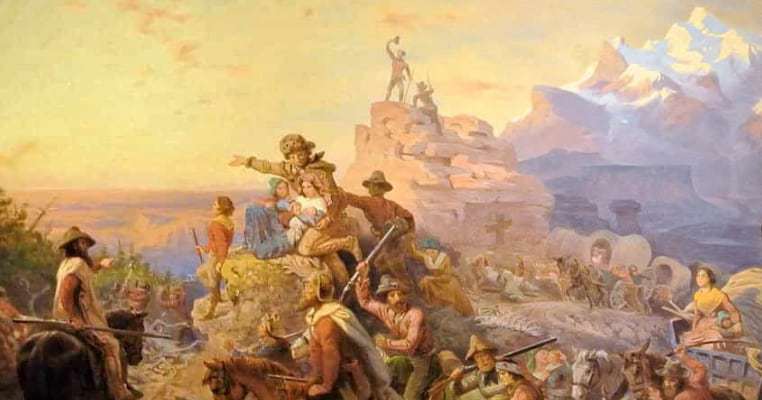Manifest Destiny – the term used to describe the inevitability of American domination of the North American continent – has always been ill-defined and somewhat vague. It was and is based in the belief that the American people possessed a divine blessing and that it was a moral and spiritual duty to spread democracy and Christianity across the continent and the world. It was not as popular a concept as most believe today, Abraham Lincoln opposed it, as did Henry Clay, Ulysses S. Grant, Martin Van Buren, Grover Cleveland, Mark Twain, and many other prominent leaders. Even the origination of the term is somewhat vague.
The concept was originally called divine destiny by John L. O’Sullivan, a journalist who wrote of the duty of the United States “to establish on earth the moral dignity and salvation of man.” Six years later he called his concept of America’s duty to spread its divine blessings manifest destiny. Cited through the nineteenth and twentieth centuries by expansionists, manifest destiny led to wars with Mexico and Spain, border disputes with England and Mexico, and the acquisition of overseas territories. It was far more than simply settling the continental United States.

Here are ten consequences of the concept of manifest destiny and the belief that it was America’s divinely appointed mission.

The Louisiana Purchase and the beginning of expansion
The concept of manifest destiny was not uttered by that name until 1845, but it really began with the Louisiana Purchase. The area of the United States doubled in size, and the idea that American democracy should and would be expanded into the new territory took hold. Political leaders in Washington of both parties seized upon the idea that such expansion was a moral imperative. The Louisiana Purchase also led to the increase in sectionalism that eventually led to the American Civil War. Not all politicians supported expansion into the West because of the slavery issue.
Northern Whigs opposed the idea of the creation of additional slave states while Southern Democratic-Republicans were eager to move into the territories of the West. The issue was largely dormant until the War of 1812, during which the United States sought to invade and conquer parts of Canada to secure its northern borders from future British transgression. The War of 1812 ended on the basis of Status Quo Antebellum, meaning there were no changes to borders or cession of territory by either belligerent. The United States also rejected a British proposal to establish an Indian state below the Great Lakes.
One reason the British proposed the Indian State was to stop American expansion across the continent, where they had significant fur trading interests in the Oregon Country. American victories in the war effectively ended the Indian threat east of the Mississippi River in the North and South and the settlements of the Midwestern and Southern states grew rapidly. By the 1820s American settlers were pouring into Texas, then a province of Mexico, at the invitation of the Mexican government. Many of these settlers were slaveowners from the Southern states of Arkansas, Tennessee, and Mississippi.
In 1829 the President of the United States of Mexico, as it was then styled by its constitution, abolished slavery by presidential order, freeing all slaves in the Republic, including those in the Mexican state of Coahuila and Texas. It became one of the leading issues of the Texas Revolution, when leaders in Texas claimed that the Mexican constitution did not address the issue of slavery nor give the President the authority to abolish the practice. The Mexicans were preoccupied by Spanish attempts to reconquer Mexico and did not have the manpower to intervene in Texas, as more and more Americans immigrated to the Mexican state.
In 1836 the Texas Revolution, with its battles of the Alamo and San Jacinto, established its independence from Mexico. The Republic of Texas drafted its own constitution, following the requirements which would make it eligible for statehood, and allowing slavery within its boundaries. It then requested annexation by the United States. The annexation of Texas would be one of the early tests of the concept of manifest destiny, and led to some of the strongest arguments for and against its existence as a divinely assigned duty of the United States. Texas and the debates over its annexation generated began the political decline of the United States into Civil War.

